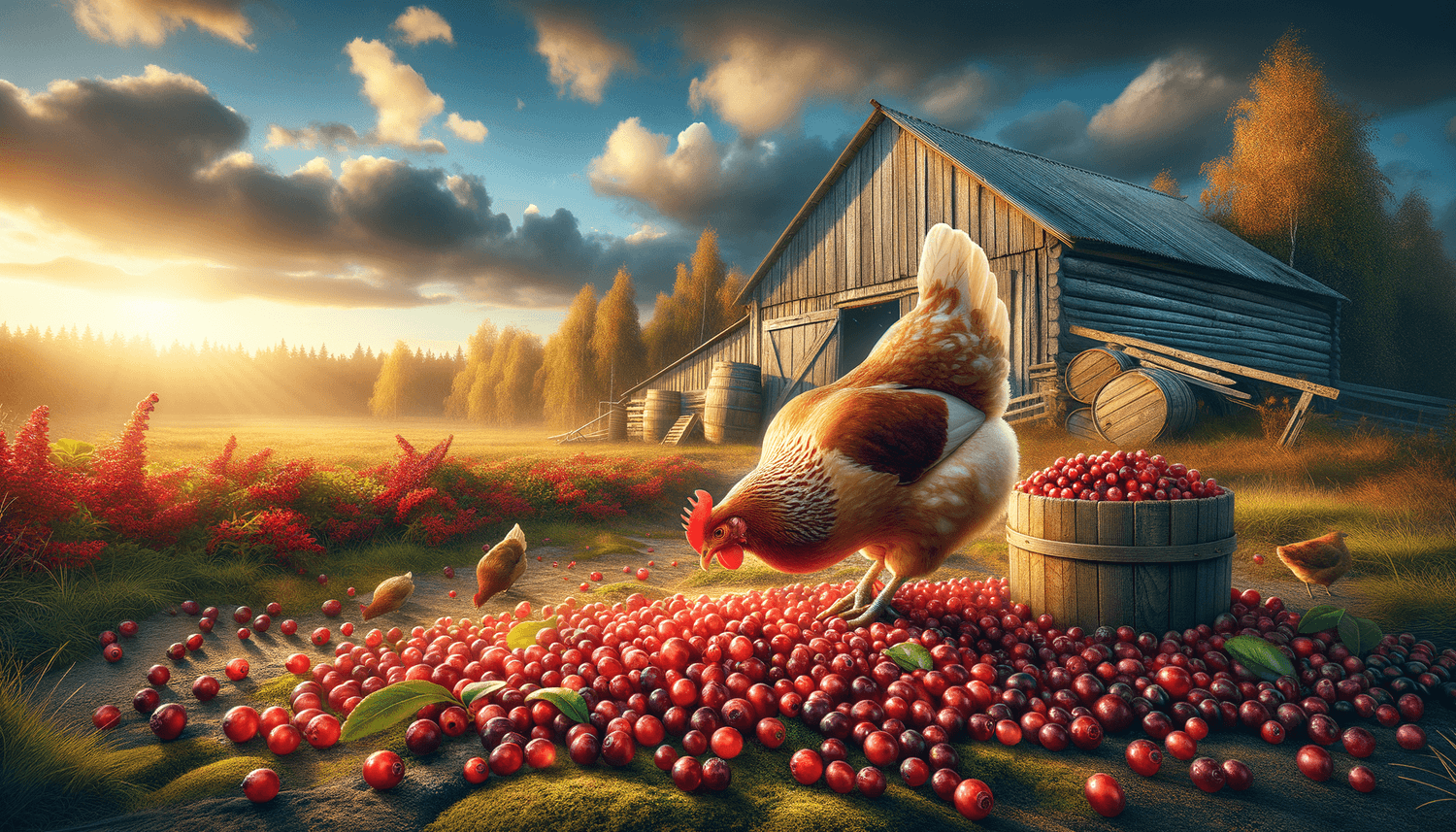Can chickens join in on the cranberry craze that seems to sweep the nation during the holiday season? In today’s blog post, we’ll be cracking the case around these tart and tasty berries, determining if our feathered friends can safely peck at this vibrant snack. To ensure your chickens are clucking with delight and maintaining their ideal health, we’ll be discussing the importance of a balanced diet, revealing the benefits and potential risks of cranberries, uncovering their nutritional value, and offering tips on how to best prepare these tangy delights for your backyard companions. Get ready to ruffle some feathers as we embark on this juicy journey together!
Can chickens eat cranberries?
Yes, chickens can indeed eat cranberries, and it is safe for them to do so. Cranberries are non-toxic to chickens and can serve as a healthy treat when incorporated into their diet in moderation. These nutrient-rich berries offer various health benefits, making them a nutritious and enjoyable snack for your backyard flock.
A balanced diet for happy, healthy chickens
Just like their human caretakers, chickens need a well-balanced diet to thrive and maintain good health. Providing your chickens with the appropriate nutrients is essential for their growth, egg production, and overall well-being. A chicken’s diet should primarily consist of high-quality chicken feed, as this specially formulated feed contains the necessary protein, vitamins, and minerals needed to support their daily nutritional needs.
Chicken feed should make up around 80-90% of a chicken’s diet since it is designed to cater to their specific nutritional requirements. The remaining 10-20% of their diet can be supplemented with wholesome treats like fruits and vegetables. These treats not only provide additional vitamins and nutrients but also keep your chickens entertained and engaged. Remember, moderation is key – overindulging your flock in tasty treats could lead to health issues caused by an unbalanced diet. So, as you spoil your backyard friends, ensure they receive ample chicken feed and the right amount of treats to keep them clucking along happily and healthily.
Nutritional value of cranberries for chickens.
Feeding cranberries to chickens indeed has nutritional value, making these tart berries a beneficial treat for your backyard flock. Cranberries are rich in vitamin C, which supports a strong immune system and enables chickens to better resist infections and diseases. This essential vitamin also aids in the absorption of iron, contributing to overall health and well-being.
Furthermore, cranberries are packed with various antioxidants that help in reducing cellular damage and improving general health. These antioxidants include vitamin E, which promotes healthy skin and feathers, and vitamin A, which is vital for maintaining good vision in chickens. Cranberries also contain trace amounts of essential minerals such as potassium, calcium, and magnesium, which aid in regulating body functions and maintaining healthy bones and eggshells.
In addition to their nutritional advantages, cranberries have a high water content, providing chickens with extra hydration, especially during hot summer months. Offering cranberries to your flock occasionally can be a smart choice, as these nutrient-dense berries can support the health and happiness of your chickens, while also providing them with a tasty and refreshing treat.
Nutrition table of cranberries for chickens.
| Information | Description |
|---|---|
| Nutritional Value | Rich in vitamins C, A, and E, antioxidants, and trace minerals like potassium, calcium, and magnesium. |
| Suggested Serving Size | A small handful per chicken, serving occasionally as a treat. |
| Safe Feeding Practices | Introduce cranberries gradually in small quantities, observing for any allergic reactions or digestive issues. |
| Preparation | Rinse and chop fresh cranberries into smaller pieces or offer dried cranberries to your chickens. |
| Potential Risks | Overfeeding can lead to an unbalanced diet and digestive disturbances. Monitor for any signs of allergy or diarrhea. |
| Hydration | High water content in fresh cranberries provides additional hydration to chickens. |
| Digestion | Cranberries are easily digestible for chickens and usually do not cause any digestion-related issues when fed in moderation. |
| Seasonal Availability | Fresh cranberries are most widely available during the fall and winter months, while dried cranberries can be found year-round. |
| Other Benefits | Cranberries can help support immune function, promote healthy skin and feathers, and improve vision in chickens. |
Introducing cranberries to your chickens
When introducing cranberries to your chickens for the first time, it’s essential to start with small portions and adjust the serving size according to your flock’s preferences and reactions. Monitor your chickens closely after feeding them cranberries to identify any signs of allergies or digestive issues, such as diarrhea or distress. If you notice any adverse effects, it’s best to consult with a veterinarian or an expert in backyard chickens for further guidance.
Preparation tips and mix ideas
To serve cranberries to your chickens, thoroughly rinse and chop fresh cranberries into smaller pieces, making them easier for your flock to pick and consume. Alternatively, dried cranberries can also be given to your chickens if fresh ones are not available. Please avoid offering sugared or coated cranberries, as added sweeteners and preservatives can be harmful to your flock’s health.
For an extra fun treat, you may consider mixing the cranberries with other chopped fruits, vegetables, and berries that are safe for chickens to eat. This can create a colorful and appetizing mix, keeping your backyard gang entertained while offering them a nutritious and diverse snack.
In summary, cranberries are a safe, nutritious, and hydrating treat for your chickens, providing a range of health benefits when incorporated into their diet with moderation. Always ensure your flock is receiving a balanced diet with high-quality chicken feed as the primary source of nutrition, and use treats like cranberries to supplement their daily intake. Happy chickens make for a delightful backyard experience, and cranberries are sure to add that extra burst of flavor to their lives!

















